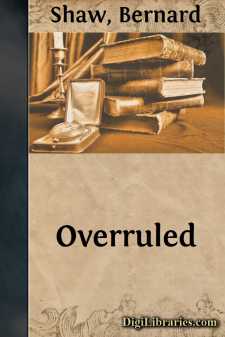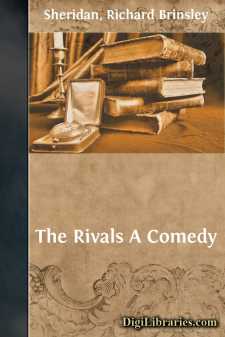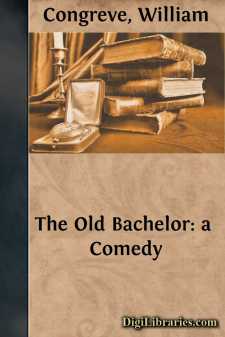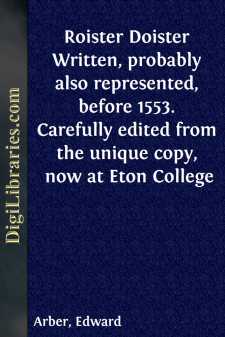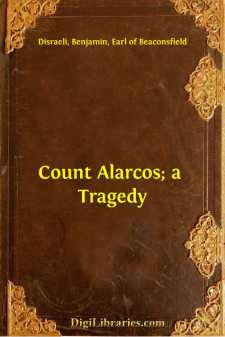Drama
- American 43
- Ancient, Classical & Medieval 45
- Asian 7
- Caribbean & Latin American 2
- Continental European 50
- English, Irish, Scottish, Welsh
- General 105
- Middle Eastern 1
- Religious & Liturgical 1
- Shakespeare 1
English, Irish, Scottish, Welsh Books
Sort by:
by:
Bernard Shaw
PREFACE Like many other works of mine, this playlet is a piece d'occasion. In 1905 it happened that Mr Arnold Daly, who was then playing the part of Napoleon in The Man of Destiny in New York, found that whilst the play was too long to take a secondary place in the evening's performance, it was too short to suffice by itself. I therefore took advantage of four days continuous rain during a...
more...
by:
John Galsworthy
ACT I The MARCH'S dining-room opens through French windows on one of thosegardens which seem infinite, till they are seen to be coterminouswith the side walls of the house, and finite at the far end, becauseonly the thick screen of acacias and sumachs prevents another housefrom being seen. The French and other windows form practically allthe outer wall of that dining-room, and between them and the...
more...
by:
Bernard Shaw
PROLOGUE The tableau curtains are closed. An English archdeacon comes through them in a condition of extreme irritation. He speaks through the curtains to someone behind them. THE ARCHDEACON. Once for all, Ermyntrude, I cannot afford to maintain you in your present extravagance. [He goes to a flight of steps leading to the stalls and sits down disconsolately on the top step. A fashionably dressed lady...
more...
by:
John Galsworthy
ACT I SCENE I The curtain rises on the BARTHWICK'S dining-room, large,modern, and well furnished; the window curtains drawn.Electric light is burning. On the large round dining-table isset out a tray with whisky, a syphon, and a silvercigarette-box. It is past midnight. A fumbling is heard outside the door. It is opened suddenly;JACK BARTHWICK seems to fall into the room. He stands holdingby the...
more...
by:
Bernard Shaw
THE ALLEVIATIONS OF MONOGAMY. This piece is not an argument for or against polygamy. It is a clinical study of how the thing actually occurs among quite ordinary people, innocent of all unconventional views concerning it. The enormous majority of cases in real life are those of people in that position. Those who deliberately and conscientiously profess what are oddly called advanced views by those...
more...
PREFACE A preface to a play seems generally to be considered as a kind of closet-prologue, in which—if his piece has been successful—the author solicits that indulgence from the reader which he had before experienced from the audience: but as the scope and immediate object of a play is to please a mixed assembly in representation (whose judgment in the theatre at least is decisive,) its degree of...
more...
by:
William Congreve
TO THE RIGHT HONOURABLE CHARLES, LORD CLIFFORD OF LANESBOROUGH, etc. My Lord,—It is with a great deal of pleasure that I lay hold on this first occasion which the accidents of my life have given me of writing to your lordship: for since at the same time I write to all the world, it will be a means of publishing (what I would have everybody know) the respect and duty which I owe and pay to you. I...
more...
by:
Bernard Shaw
ACT I Great George Street, Westminster, is the address of Doyle and Broadbent, civil engineers. On the threshold one reads that the firm consists of Mr Lawrence Doyle and Mr Thomas Broadbent, and that their rooms are on the first floor. Most of their rooms are private; for the partners, being bachelors and bosom friends, live there; and the door marked Private, next the clerks' office, is their...
more...
by:
Edward Arber
INTRODUCTION. HE author and early date of the present Comedy are ascertained by a quotation in Sir Thomas Wilson’s Rule of Reason of Roister Doister’s letter to Dame Custance. The first edition of the Rule of Reason, 1550-1, is a very scarce work; of which I have been unable to see a copy. The second edition, 1552, 8vo, ‘newely corrected by Thomas Wilson,’ has not the quotation: which...
more...
ACT I SCENE 1 A Street in Burgos; the Cathedral in the distance. [Enter Two Courtiers.] I:1:1 1ST COURT.The Prince of Hungary dismissed? I:1:2 2ND COURT.IndeedSo runs the rumour. I:1:3 1ST COURT.Why the spousal noteStill floats upon the air! I:1:4 2ND COURT.Myself this mornBeheld the Infanta's entrance, as she threw,Proud as some hitless barb, her haughty glanceOn our assembled chiefs. I:1:5 1ST...
more...






